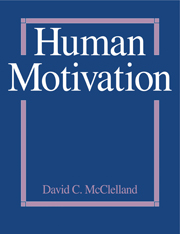Book contents
- Frontmatter
- Preface
- Foreword
- Contents
- Part 1 Background
- Part 2 The Nature of Human Motives
- 4 Emotions as Indicators of Natural Incentives
- 5 Natural Incentives and Their Derivatives
- 6 Measures of Human Motive Dispositions
- Part 3 Important Motive Systems
- Part 4 Contextual Effects on Human Motives
- Bibliography
- Acknowledgments
- Index
4 - Emotions as Indicators of Natural Incentives
Published online by Cambridge University Press: 05 July 2014
- Frontmatter
- Preface
- Foreword
- Contents
- Part 1 Background
- Part 2 The Nature of Human Motives
- 4 Emotions as Indicators of Natural Incentives
- 5 Natural Incentives and Their Derivatives
- 6 Measures of Human Motive Dispositions
- Part 3 Important Motive Systems
- Part 4 Contextual Effects on Human Motives
- Bibliography
- Acknowledgments
- Index
Summary
• EARLY ATTEMPTS TO FIND A BIOLOGICAL BASIS FOR MOTIVES
Motives as we experience them are bewilderingly complex. We want to graduate from College. We would like to be respected by others. We want to be loved. We would like to get married. We would like some excitement in our lives. Or perhaps we would just like to be able to study harder. Where do these motives come from? Are they instinctive, as McDougall, Freud, and Maslow argued (see Chapter 2)? Are they simply the product of our learning to satisfy certain biological needs like hunger, as the behaviorist model argued (see Chapter 3)? Do we learn to want these things because our society teaches us that we should want them? Or are there some deeper drives guiding human action that shape society?
Initially many theorists like McDougall had found it easy simply to reason that certain fundamental urges were biologically built in, or instinctive. The behaviorists, however, were skeptical. They felt such a hypothesis was vague and impossible to test empirically. How could one prove that a drive for power, for example, was instinctive rather than built on social learning? Since the behaviorists were oriented entirely toward overt behavior (rather than inner “urges”), they not unreasonably asked what were the fixed action patterns, shown by all human infants (prior to learning), that would signal the presence of an innate power need.
- Type
- Chapter
- Information
- Human Motivation , pp. 107 - 129Publisher: Cambridge University PressPrint publication year: 1988



